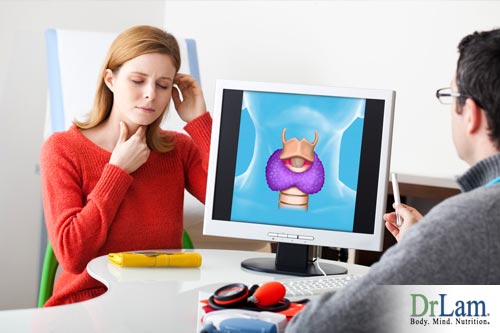
 The holidays are a time where we tend to indulge in comfort foods, spend time relaxing with friends and family, neglect exercising, and generally add a few inches around the belly area. Thyroid issues, however, may see those inches increasing even if you follow a calorie-restricted diet and spend hours at the gym exercising.
The holidays are a time where we tend to indulge in comfort foods, spend time relaxing with friends and family, neglect exercising, and generally add a few inches around the belly area. Thyroid issues, however, may see those inches increasing even if you follow a calorie-restricted diet and spend hours at the gym exercising.
The first step to understanding the signs and symptoms of thyroid problems is to become aware of what the thyroid is and how it acts and reacts within the body. The thyroid has a large contributory role in relation to many factors of metabolic health and overall body function. In this article, we will explore a few methods that you can use to help determine if some of your health issues are a result of improper thyroid function, and what to do about it.
From a clinical perspective, the thyroid is a large gland, in the neck, that secretes hormones which regulate growth and development through the mechanism of metabolic adjustment. The metabolic aspect of how the thyroid functions is to release hormones which increase the basal metabolic rate which has a significant effect on the majority of body tissues.
Your appetite, gut motility, and even absorption of substances are all affected by thyroid gland hormones. Thyroid hormones increase absorption during digestion as well as play a role in the breakdown of glucose. There is a correlation between blood cholesterol levels and thyroid hormone levels. When there is more thyroid hormone present in the blood, cholesterol levels decrease.
Aside from its role in digestion, the thyroid also controls the strength and rate of heart activity. This is a pivotal aspect of thyroid hormone function as the lack of proper cardiovascular response can be extremely detrimental to your health in a multitude of ways.
The final aspect in the overall functions of the thyroid gland is developmental. For young people, the thyroid controls their growth rate and plays a very important role in brain development. For these reasons, it is necessary to have the ability to identify the signs and symptoms of thyroid problems.
There are two weight issues associated with a compromised thyroid gland: weight loss, and weight gain.
People with an underactive thyroid often have low basal metabolic rates. This means that the starting point from which your body regulates its metabolism is lower than what you need to maintain a healthy weight, thus setting you up for failure.
When you have hypothyroidism, the problems go farther than just what you eat, and they affect weight loss. This is because even when you’re dieting, an underactive thyroid gland will cause your body to conserve even more calories than before. It turns into a cyclical nightmare. If you have any of these symptoms, it is good to be aware your thyroid may be causing them.  Weight gain and struggles to shed excess fat from our bodies is one of the most apparent problems that the thyroid can cause but it isn’t the only one by any stretch. When trying to assess whether or not you have a thyroid problem, it is important that you contact a healthcare professional to conduct simple tests to discover if that is the root cause of your imbalance. Trying to self-diagnose is not the recommended way to embark on a path to solution-seeking. The signs and symptoms of thyroid problems can be much more complex than simply gaining weight, so a clinical opinion is a safe outlet to exploit.
Weight gain and struggles to shed excess fat from our bodies is one of the most apparent problems that the thyroid can cause but it isn’t the only one by any stretch. When trying to assess whether or not you have a thyroid problem, it is important that you contact a healthcare professional to conduct simple tests to discover if that is the root cause of your imbalance. Trying to self-diagnose is not the recommended way to embark on a path to solution-seeking. The signs and symptoms of thyroid problems can be much more complex than simply gaining weight, so a clinical opinion is a safe outlet to exploit.
The list of signs and symptoms of thyroid problems can be seemingly endless. We will dig a little deeper into exhaustion and fatigue in this section, but first, let’s list some of the possible indicators. A problem with your thyroid can become apparent if you are nervous, moody, weak, tired, losing hair, constipated; have memory problems, dry skin, or issues breathing. If that list seems like a lot, it is. There is no shortage of signs and symptoms of thyroid problems, so if what you’re experiencing is not mentioned in this article, don’t rule out the possibility of a thyroid issue.
Fatigue and exhaustion are things that affect all of us from time to time. The real problem arises when it becomes so frequent that it keeps you from completing the tasks that life demands. When your body does not produce adequate levels of thyroid hormone, your metabolic rate drops and your body simply can’t access enough energy to do what it is meant to. Without sufficient thyroid hormone, your heart rate and oxygen uptake can’t always keep up with the demands that your environment places on you.
There are a number of things you can look at when addressing the issue. For example, an iodine deficiency is often linked to a lack of thyroid hormone production. Because of this, dietary supplementation may replace or raise levels of iodine in someone who has an iodine deficiency.
If you have an extreme case of hypothyroidism and it is not possible to use natural alternative medicine to rebalance your thyroid hormone levels, it may be necessary to use medications to relieve symptoms until a proper solution is decided upon to resolve the issue.
You should always consider all of your options before making the choice to change your routine or lifestyle to affect change in your physiology. Consulting someone with experience and qualifications is always a good place to start. It is not common to have continued success in self-treatment without clinical supervision and insight. Some of the signs and symptoms of thyroid problems can be vague and often associated with other medical conditions. Because of this, if you have a real concern that your thyroid is what is ailing you physically, you should reach out and contact a professional to help you determine what the root cause of your problems is.
 The body has a complex system through which it reacts to external stressors. This system is known as the NeuroEndoMetabolic (NEM) Stress Response. Starting at the base of the brain in the hypothalamus, signals are sent to the pituitary gland and then onto the adrenal glands where hormones are secreted to elicit a physical reaction. The main hormone that is released by the adrenal glands during stress is called cortisol. Cortisol has a multitude of effects on your body. This includes the manipulation of heart rate, cholesterol uptake, digestive suppression, and it also has an effect on the immunological response.
The body has a complex system through which it reacts to external stressors. This system is known as the NeuroEndoMetabolic (NEM) Stress Response. Starting at the base of the brain in the hypothalamus, signals are sent to the pituitary gland and then onto the adrenal glands where hormones are secreted to elicit a physical reaction. The main hormone that is released by the adrenal glands during stress is called cortisol. Cortisol has a multitude of effects on your body. This includes the manipulation of heart rate, cholesterol uptake, digestive suppression, and it also has an effect on the immunological response.
When we consider the signs and symptoms of thyroid problems, it is necessary to understand that high levels of cortisol have an effect on thyroid hormones. Studies have shown that the synthesis of unusable T4 thyroid hormone, to the usable T3 hormone, is slowed down by the presence of cortisol. This is not a problem when it happens in isolated circumstances, but when someone is under continued stress and their cortisol levels are unusually high for long periods of time, this can result in what has the same effect as hypothyroidism. It’s not that the thyroid is producing low levels of thyroid hormone, but because there is not sufficient synthesis of T4 to T3, it has the same effect.
One of the main problems that people, with elevated stress levels, complain about is weight gain and exhaustion. When the synthesis talked about (above) is halted, both tiredness and weight gain are commonly present.
Adrenal Fatigue Syndrome (AFS) is a lesser-known affliction that affects many people. Because of the complex network associated with the NEM Stress Response, the large burden of stress is placed on the adrenal glands. When the adrenal glands are called upon to produce hormones, such as cortisol, on a continual basis, they can struggle to keep up with the demand.
When the adrenal glands can no longer cope with the demand required by the signals sent from the hypothalamus, the body enters a state called Adrenal Fatigue (AF). Some of the effects of AF can look very similar to the signs and symptoms of thyroid problems if not understood correctly. Because the body is so complex and there are so many overlapping signals that can be interpreted in various ways, it is sometimes necessary to consult healthcare professionals to decipher the root cause of your ailments. As we have mentioned earlier, it is imperative to take care when embarking upon self-diagnosis, and safety should be the main focus when approaching your health.
If you think that your thyroid is contributing to your AF, there are some things that you can do to try to mitigate the negative effects. Iodine deficiency is often linked to poor thyroid hormone production. You can increase your iodine intake by practicing a form of dietary supplementation to help restore balance to your thyroid. There are many iodine-rich foods that can easily be incorporated into your diet. Cranberries, yogurt, strawberries, and potatoes are all rich in iodine, to name a few. Excessive iodine is not recommended, however.
 There is no way for most of us to avoid stress in our daily lives. It is quite normal to experience stressful events or situations at work, home, and in your relationships. The thing that we all have to be aware of is how that stress is affecting the body. AF can take hold in a short period of time and can reach a very advanced and dangerous state. There is a cyclical effect that takes place where the fatigue from stress can cause stress on its own. It is important that you become aware of the different areas through which you can identify AF along with the signs and symptoms of thyroid problems.
There is no way for most of us to avoid stress in our daily lives. It is quite normal to experience stressful events or situations at work, home, and in your relationships. The thing that we all have to be aware of is how that stress is affecting the body. AF can take hold in a short period of time and can reach a very advanced and dangerous state. There is a cyclical effect that takes place where the fatigue from stress can cause stress on its own. It is important that you become aware of the different areas through which you can identify AF along with the signs and symptoms of thyroid problems.
When you have a thyroid issue along with AF, you could be in a very unpleasant situation. A spot of hope in the big picture is that there are ways to test for levels of thyroid hormone in the body. If you believe that you have a thyroid condition it is important to contact your healthcare provider and ask for a test. To understand if you are experiencing underactive or overactive thyroid, a quick test is the most simple way to be sure.
Once you can rule out the possibility of a thyroid issue then it will be easier to focus your recovery efforts on more specific issues such as AF. If it turns out you have a thyroid issue, that’s not the end of the world. There will be a starting point from which you can begin to treat yourself and start the journey to rebalancing.
Testing for thyroid issues is as simple as taking a blood test. The test looks at your thyroid hormone levels and well as the thyroid-stimulating hormone levels released by your pituitary gland. People with hypothyroidism have high thyroid-stimulating hormone levels low thyroid hormone levels, while people with hyperthyroidism have lower thyroid-stimulating hormone levels and higher thyroid hormone levels.
If suffering from hyperthyroidism, you may also undergo an iodine uptake test that tracks how much iodine your thyroid gland absorbs and helps identify the cause of the problem.
Losing weight with hyperthyroidism starts with addressing the issue itself. In other words, trying to get your thyroid to produce normal quantities of thyroid hormone. This may start with taking the necessary supplements to do so, including, amongst others, iodine. It may also include taking thyroid hormone replacement medications. Whichever course of action you decide to follow, please make sure that you adhere to the instructions given you by your primary healthcare professional.
The next step is diet. A diet high in carbohydrates and sugars that are easily broken down and absorbed tends to add to the problem. Instead, focus on lean proteins and plenty of vegetables. They tend to make your metabolism work harder at breaking them down, thereby burning more calories and thus losing weight.
Another point to remember is to get enough sleep. Did you know that sleep deprivation tends to encourage weight gain? Aim for approximately eight hours of sleep each night.
Correct exercise also promotes weight loss. This does not mean you need to go do a strenuous workout at the gym. Gentle exercise, especially when starting out, is best. Think along the lines of taking your dog for a brisk walk, yoga, or taking a Pilates class.
You should always pay attention to what your body is telling you. Thyroid issues and adrenal fatigue have many similar symptoms. Doing the labs could help you identify whether you have a thyroid issue.
If suffering from weight gain due to thyroid issues, the following may help with the situation:
If you would like to know more about dealing with thyroid issues or need some assistance in addressing the problem, the team at Dr. Lam Coaching can help. We offer a free** no-obligation phone consultation at +1-626-571-1234 where we will privately discuss your symptoms and what your options are. You can also send us a question through our Ask The Doctor system by clicking here.
